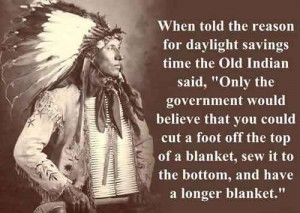 Last weekend the US entered Daylight Savings Time. This is always a moment of great grumbling as people lose an hour of sleep to the clock change. Facebook posts pop up with anti-Daylight-Savings memes of various types. This one in particular had led me to think a lot about the nature of the day and this tradition of Daylight Savings.
Last weekend the US entered Daylight Savings Time. This is always a moment of great grumbling as people lose an hour of sleep to the clock change. Facebook posts pop up with anti-Daylight-Savings memes of various types. This one in particular had led me to think a lot about the nature of the day and this tradition of Daylight Savings.
On the one hand it is completely true that moving the clock has no effect on the length of the actual day. On the other hand, it has been shown that people use less electricity during the full day in places that have daylight savings versus those that do not. The reason is fairly obvious. During daylight savings, when we wake up an hour earlier it is light outside already for most of us, and then it gets dark an hour later despite the fact that we are likely to go to bed at the same time on the clock as we would have during the winter. Studies have also shown that commerce picks up in the evening hours of summer days that stay light until very late.
So, despite the fact that we haven’t changed anything about the nature of the 24 hour clock or the position of the sun in the sky, we have changed the perception of the daylight hours during the day, and thereby increased commerce in the period we generally think of as after-work-hours as well as limiting our use of artificial light in the evenings.
What is really going on here?
It’s not that the day has changed. It’s that our perception of the day relative to the clock has changed. And the reason that matters is because we are culturally attuned to the hour on the clock more than the cycle of the sun and stars through the sky.
To extend the analogy in the “Old Indian and the Blanket” meme, we have to think about cultural expectations about blankets.
Now, I may have a blanket that has a pretty part at the bottom and a rather dull part at the top. I could take the blanket and turn it around so that the pretty part is at the pillow side of the bed, but I don’t want to do that. The foot of the blanket has a different binding from the top and it also has a paper tag that says things like what materials the blanket is made of and how I ought to clean it. If I want the pretty part of the blanket up near my face when I’m snuggled into bed, I might carefully cut the binding off the top and bottom, cut the pretty part off the blanket, sew that part onto the top of the blanket, and then put the top and bottom bindings back into place. Now I have a blanket that looks like I want it to.
Or maybe I just rip out the bindings and swap them. Same result.
Now the part of the blanket I want to be close to my face has the “top” binding and the bottom is what it is. Have I changed the actual length of the blanket? Nope! I just put the part I wanted near my face.
Our culture is bound to the clock. School starts at 8:30 in the morning. Work starts at 9:00. Dinner might be at 6:00pm. The news is at 10 or 11.
We could solve our problem of available daylight hours and waking hours by simply agreeing to start everything an hour earlier through the summer, starting somewhere around the Spring Equinox and ending somewhere around the Fall Equinox. But we don’t. And why not?
Because we hate waking up earlier in the morning as much as we hate going to bed earlier at night!
It doesn’t matter what time you normally wake up, if you have to change it, your perception of the day is altered. If you always wake up at 7am, waking up at 6 is a huge chore. And if you are used to heading to bed at 11 o’clock at night, you are bound to have more trouble falling asleep on the night that you have to go to bed at 10 in order to squeeze your eight hours in before the next big day.
Daylight Savings Time is a response to our relationship with clocks, pure and simple.
Having realized that, and let it sink in, I find myself asking about what other cultural overlays are getting in the way of my natural relationship with the world outside. If we are so married to the hour on a clock that we don’t want to go to sleep an hour earlier and wake up an hour earlier, what other behaviors have become so disengaged from reality that we struggle to realign myself with the real rhythms of the world outside?
Considering our culturally bound existence, is it not better to trick ourselves into aligning ourselves with natural rhythms through further manipulation of the synthetic reality we’ve created?
















